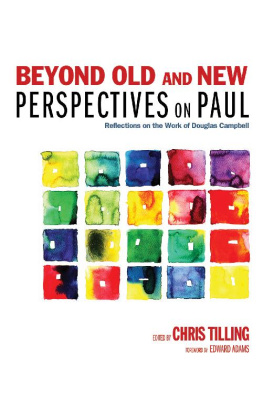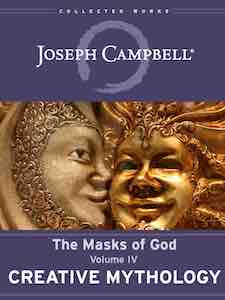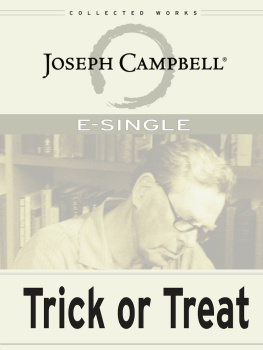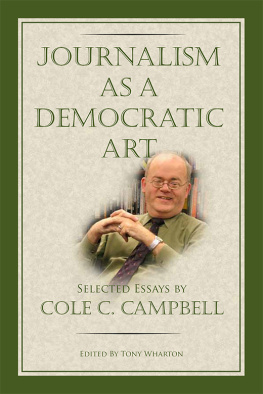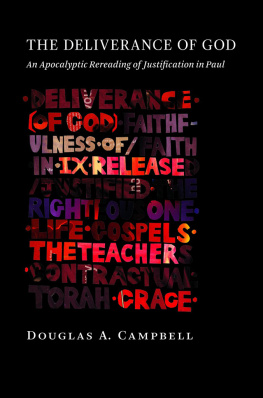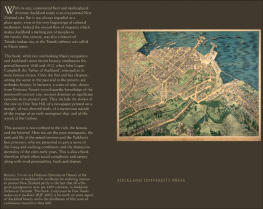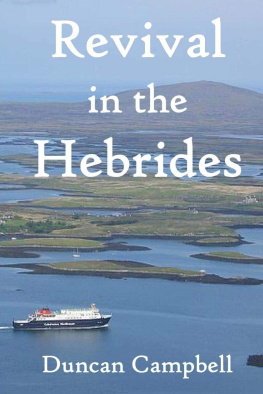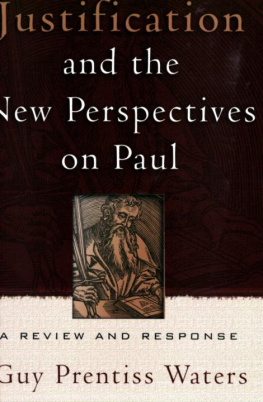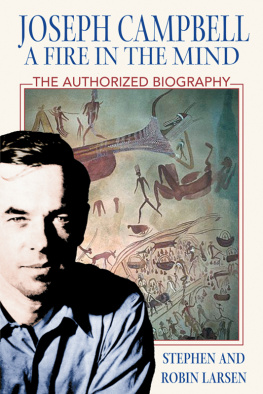Beyond Old and New Perspectives on Paul
Reflections on the Work of Douglas Campbell
Edited by
Chris Tilling
With a Foreword by Edward Adams
Beyond Old and New Perspectives on Paul
Reflections on the Work of Douglas Campbell
Copyright 2014 Chris Tilling. All rights reserved. Except for brief quotations in critical publications or reviews, no part of this book may be reproduced in any manner without prior written permission from the publisher. Write: Permissions, Wipf and Stock Publishers, W. th Ave., Suite , Eugene, OR 97401 .
Cascade Books
An Imprint of Wipf and Stock Publishers
W. th Ave., Suite
Eugene, OR 97401
www.wipfandstock.com
isbn : 978-1-62564-173-1
eisbn 13: 978-1-63087-188-8
Cataloging-in-Publication data:
Beyond old and new perspectives on Paul : reflections on the work of Douglas Campbell / edited by Chris Tilling ; with a foreword by Edward Adams.
xvi + p. ; cm. Includes bibliographical references and indexes.
isbn : 978-1-62564-173-1
. Campbell, Douglas Atchison, 1961 .. Bible. Epistles of PaulTheology.. Bible. RomansCriticism, interpretation. I. Adams, Edward. II. Title.
BS2655.J8 T584 2014
Manufactured in the U.S.A.
Chapter : Torrance, Alan. A Review of Douglas Campbells The Deliverance of God from a Theological Perspective 2012 Scottish Journal of Theology. Originally published in Scottish Journal of Theology . ( 2012 ) . Reprinted with permission.
Appendix A: Torrance, James B. Contribution of McLeod Campbell to Scottish Theology. 1970 Scottish Journal of Theology. Originally published in Scottish Journal of Theology . ( 1970 ) . Reprinted with permission.
Appendix B: Torrance, James B. Covenant or Contract: A Study of the Theological Background of Worship in Seventeenth-Century Scotland 1973 Scottish Journal of Theology. Originally published in Scottish Journal of Theology . ( 1973 ) . Reprinted with permission.
For my students and colleagues at St. Mellitus College and Kings College London
Even more than the Reformers did, we must let God and His Word be one, with more emphasis, more joy, more consistency, and we must let Jesus Christ be even more self-evidently the one Mediator between God and humanity.
Karl Barth
Foreword
I n December 2011 , at Kings College London, was convened a conference critically engaging with Douglas Campbells monumental The Deliverance of God. A follow-up conference was held in November 2012 at Duke Divinity School. The present volume arises from papers presented at these gatherings. It is appropriate that the first conference took place at Kings, where Douglass work on the project that would lead to Deliverance began in earnest. I was a colleague of his during his time at Kings and witnessed first hand the early birth pangs of the project. It was a great delight to welcome my old friend back to Kings to celebrate and reflect critically on his achievement. And what an achievement! The breathtaking vision of the work, the immense learning that Douglas demonstrates, the depth of his conceptual penetration, the boldness and originality of his thinking, and his extraordinary ability to mount and sustain a highly complex yet sharply focused argument over the course of more than 1,200 pages make Deliverance a truly astonishing intellectual feat.
The Deliverance of God is one of the most significant books on Pauls theology ever written (as well as one of the longest!) and as such deserves very serious scholarly attention. The two conferences were structured to give Douglas an opportunity to recapitulate and clarify his main claims in the book and to enable invited biblical scholars, church historians, and theologians to offer their critical reactions to aspects of the work. Participants were generally in sympathy with a good deal of what Douglas says in the book, and where critical concerns were raised and (sometimes strong) disagreements were expressed, appreciative notes were also sounded. The friendly tenor of the conference proceedings is reflected in the volume contributions.
The title chosen for the first conference, retained for the second, and adopted as the title of the present book, reflects Douglass concern to move beyond both Lutheran readings of Paul and the New Perspective on Paul (Michael Bird has helpfully labelled Douglass work a Post-New Perspective on Paul).
The length and complexity of Deliverance make it a formidable read! This collection of essays is designed in part to introduce the concerns of that book more accessibly. It is worth pointing out that Douglas has provided an overview of the argument of Deliverance in an article in Expository Times (Vol. no. , pp. ) and a summary of his take on Pauls theology in Four Views on the Apostle Paul (ed. Michael F. Bird, Zondervan, 2013 ).
In the preface, Chris Tilling, the editor of this volume, expresses various thanks. I would like to thank Chris himself not only for his work in editing the book but also for initiating the Kings conference and thus setting in motion the whole endeavor. My role in the whole has been very minimal, but it has been a pleasure and privilege to be part of it.
Edward Adams
Preface
T he book you are now holding grows out of two conferences focusing on the work of Douglas Campbell, particularly his exciting, brilliant, controversial, learned, and truly remarkable monograph, The Deliverance of God . The first conference was held at Kings College, London, and the second, at Campbells own Duke University, North Carolina. The title of this book is indeed the name chosen for the Kings conference. Both drew on the wisdom and critical insights of classicists, systematic theologians, church historians, and (of course) New Testament scholars, a multidisciplinary response entirely appropriate to the subject matter of our discussions. The papers, the responses, the plenary debates, and the contributions from some exalted visitors all made the experience both an education and a delight, and we hope to have captured something of that vital dynamic in the following pages. A number of fortuitous meetings led to the richness of those meetings. I am particularly grateful for an entirely unplanned encounter and conversation with Dr. Robin Griffith-Jones on the London Underground, which led to his contribution in this volume.
The ethos of this book is detailed in the introduction, so let me get straight to some important thank yous. We are very grateful for the team from Grace Communion International who filmed the main sessions of the London conference, making the live discussions available to a much wider audience (it can be found online at http://www.gci.org/media/paulconf 2011 ). The book wouldnt have been possible without the help of a team of people who kindly volunteered aid at various stages. In this vein, thanks to a great team of proofreaders, namely Mia Smith, Doug Iverson, Dr. Jeffrey Gibson, Rhona Holliday, Jon Bennett, Tim Hall, Bryan Lewis, and Dr. Brian Tucker. Also thanks to Stephanie Gehring, Douglass research assistant, for her help in formatting the manuscript, and to Dr. Carl Sweatman for his valuable work on Alan Torrances article, and Appendix . Your helpfulness and kindness throughout this project was invaluable. Thanks to Mia Smith for final stage proofreading, to Dr. Rafael Rodriguez for his critical comments on a draft of a chapter, and to Shawn Wilhite for his work on Appendix . The rising star, William Glass, also generated a complete bibliography, for which I am immensely grateful. Joseph Longarino and Katie Law did a tremendous job with the indices. I am deeply indebted to Ashley Douglas for converting the appendices from old pdf files! My own precious wife, Anja Tilling, also kindly helped on this frontand on many others besides! While on the subject of wives, I ought to thank Rachel Campbell, Douglass spouse, for providing vital impetus for the conferences. To have the wisdom and input of scholars such as Prof. Richard Bauckham, Prof. Jeremy Begbie, Dr. Willie Jennings, Prof. David Steinmetz, Prof. Richard Burridge, Dr. Edward Adams and others was a sincere privilege, so our thanks to you all for attending many of those early debates. I reserve a special mention for Dr. Andrew Perriman who flew to the London conference from Dubai! Finally, a warm thanks to the wonderful team at Wipf & Stock, all of whom I consider friends. In this respect, a special thanks to Robin Parry for his editorial skills.

